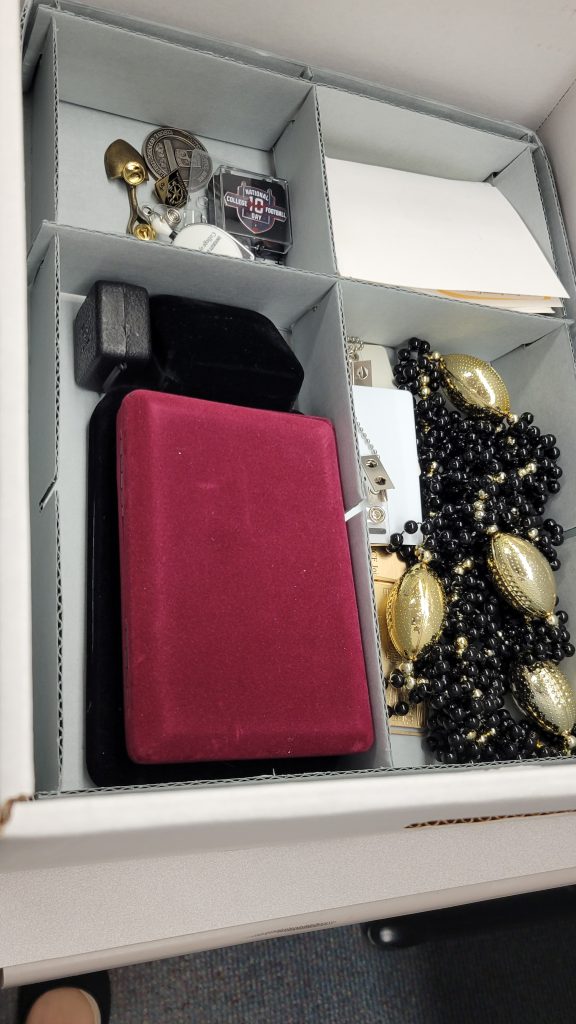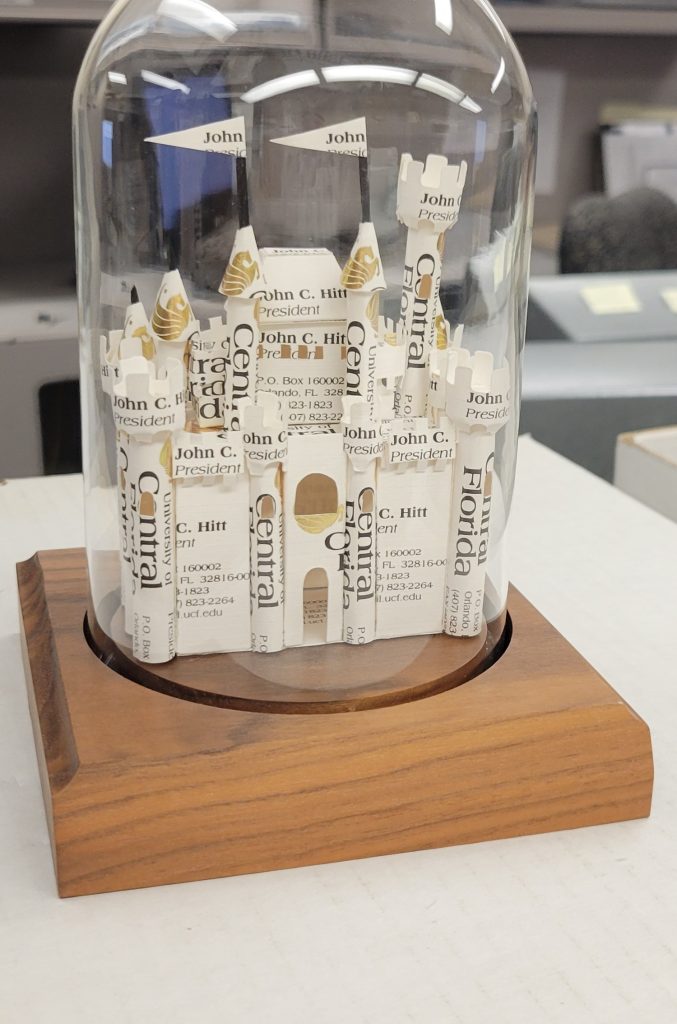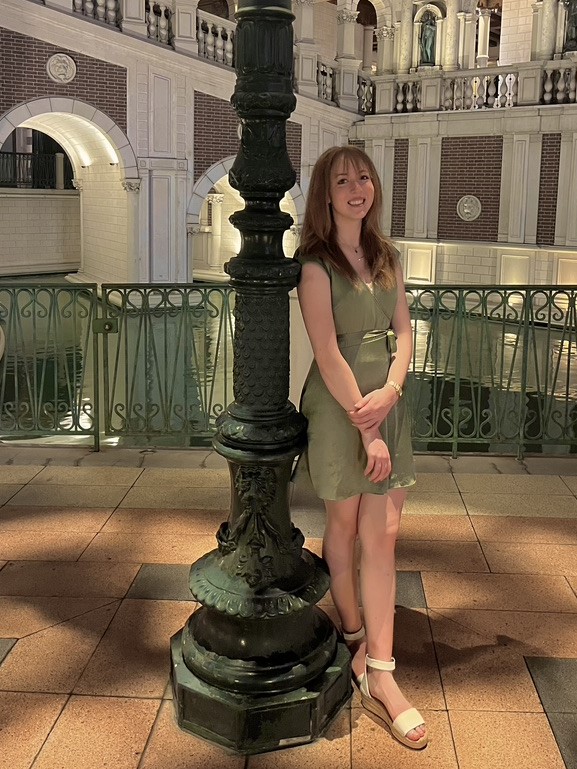Lessons Learned Processing The John C. Hitt Collection at UCF’s Special Collections and University Archives
Written by Laurel Holt and Rachel Walton
Laurel spent this past summer interning in the Special Collections University Archives (SCUA) department of the University of Central Florida’s Library, as part of her participation in the Rollins’ Student-Faculty Collaborative Scholarship program (SFCS). As one of the largest public universities in the United States, UCF has an impressive collection of archives and books which are kept in the John C. Hitt library. Coincidentally, the collection Laurel found herself working on in summer 2024 was the papers recovered from John C. Hitt’s Presidential office when he retired from his position as president of UCF in 2018. Hitt was president for 26 years (1992-2018) and remained employed at UCF as President Emeritus until his death in 2023.



Memorabilia items from the John C. Hitt Collection
The John C. Hitt Collection was made up of files transferred from Hitt himself at the end of his presidency as well as files transferred by Sandra Cherepow, Hitt’s executive assistant for most of his time in office. Laurel had no previous experience working in Archives, but over the course of the six week internship, she was able to process the collection in full and create an online finding aid that describes the scope and content of the materials for the benefit of the public (https://scua.library.ucf.edu/repositories/2/resources/320).
She started by looking through everything in the collection and seeing what the materials offered in terms of diversity of content and type. This was a thorough step that created an inventory of all collection contents. She immediately realized that there was a lot of sensitive information in the files as she began her inventory work. After consulting her on-site supervisor, Archivist Arielle Petrovich, Laurel was told to flag any potentially sensitive information that could be reviewed and redacted later. By the end of this process, more than 200 pages were flagged across the collection.
After taking a complete inventory and flagging, Laurel moved onto creating the finding aid that would describe the collection in detail for researchers. This was done in steps, and the Arielle provided guided worksheets for each step in the creation of the finding aid to help the interns navigate this complicated work; this was very helpful in determining what information from the inventory should end up and be highlighted and mentioned in the final finding aid.
When Laurel began work on the finding aid, she first developed sufficient metadata about the physical materials. She then researched John C. Hitt’s life so she could write up the biographical note. This took a little longer than expected because it was difficult to find unbiased sources about President Hitt and his administration. While there was a lot of information about Hitt on the UCF website, there wasn’t much anywhere else. One critical topic that Laurel had to look into deeply, aside from simply Hitt’s life and career accomplishments, was related to Hitt’s later years in the office of the President. In 2019, Hitt was implicated in a financial scandal. Allegedly, about $38 million in Education and General Funds money was used to tear down and rebuild Trevor Colbourn Hall – these funds were not approved for that purpose. Laurel was unsure about whether she should mention this controversy in the finding aid – while she wanted to provide useful information in an uncensored way, she did not want to play into campus rumors either. After consulting with Arielle, Laurel decided to provide a summary of the allegations as they appeared in reputable local sources and then explain the outcome of the investigation per the campus committee’s findings. This experience stressed to her that it is important to find varied, accurate, and/or unbiased sources for fact finding and fact checking, when building a archival finding aid.

Once the finding aid was complete and reviewed by Arielle, it was time to started refoldering to ensure the materials were ready to be used by patrons. Folders need to be labeled correctly so researchers can find what they’re looking for in each box, especially with a sizable collection like this one. However, this can be a mundane and time-consuming process, but it was an important step, nonetheless – Laurel nearly finished this step when her internship ended.

When Laurel reflected on her time in the UCF Archives, she felt she learned a great deal about archival work. But the thing she said stood out to her the most was how to recognize and handle sensitive information – a great skill for a future lawyer! In the end she found approximately 55 papers with social security numbers, a few bank statements with account numbers, countless papers with other personally identifiable information about people applying to or working at the University, and a fair number of records containing student grades. She developed a skill for noting how to identify sensitive information in the record. And furthermore, she became well-trained in recognizing if information should be redacted from a paper record or if, alternatively, the whole record needed be destroyed. Another important lesson was that, when writing the biographical note for the finding aid, it was difficult to determine what should be included and what could be left out. It’s important to know what information is historically important and relevant to researchers but to still avoid overdocumentation, so that there is less “fluff” to sift through when trying to get to the needed information. After all, in the digital information age, high quality descriptions in an online finding aid will result in better search results for researchers and lead to increased use and visibility of archival collections.
Overall, Laurel found the internship to be a very valuable experience, and she was grateful for the opportunity to stretch new muscles and try new things. To anyone looking for more work experience to add to their resume or for those hoping to learn more about a career in libraries or museums, Laurel would highly recommend working, interning, or volunteering in an academic archive.
Laurel Holt is a junior at Rollins College double majoring in History and Political Science. She plans to go to law school after graduation and is excited to learn which legal sector might be the best fit for her many skills and talents. Laurel is from Saint Joseph, Michigan, which is a small town located straight across Lake Michigan from Chicago. She loves the city but feels equally at home in sunny Central Florida. And, in the Spring of 2025, Laurel will be studying abroad in Greece!

Laurel and Rachel (librarian and faculty member) wrote this blog post together after partnering up in the summer of 2024 for a 15-week Student Faculty Collaborative Research Scholarship experience. Since that time Laurel has presented about her work in a undergraduate research poster symposium at Rollins and as a panelist at the Florida Historical Society (FHS) Annual Meeting at the University of Central Florida.
